Here’s a quick look at some notable books—new titles from the likes of Caitlin Horrocks, Richard Russo, Lyz Lenz, Nell Zink, and more—that are publishing this week.
Want to learn more about upcoming titles? Then go read our most recent book preview. Want to help The Millions keep churning out great books coverage? Then sign up to be a member today.
The Vexations by Caitlin Horrocks
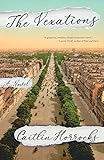 Here’s what Publishers Weekly had to say about The Vexations: “Horrocks’s vivid, hard-edged debut about French composer Erik Satie focuses on his erratic career, difficult personality, and dysfunctional family. In 1872, widower Alfred Satie leaves his children—six-year-old Eric, youngest brother Conrad, middle sister Louise—to be raised by their grandmother in Normandy. A great-uncle takes Louise to live with him. When the grandmother dies, Alfred brings the boys home to Paris. By his early 20s, Eric, now calling himself Erik ‘with a k,’ plays piano at Chat Noir and other Montmartre cafes. Louise, widowed within a year of getting married, resides with her son on her husband’s debt-ridden estate, until relatives confiscate both the estate and the son. Often neglectful and hurtful of friends and family, Erik collaborates with modernists like Cocteau and Diaghilev to varying success. Horrocks includes the perspectives of Erik’s onetime librettist (fictional Philippe) and sometime lover (real-life Suzanne Valadon) for a portrait of avant-garde turn-of-the-century Paris that proves art isn’t easy and neither are artists. Horrocks shines while envisioning Erik scoring a silent film, debuting a masterpiece, or being released from jail (where he was held for defaming a reviewer) so he can complete a commission. Horrocks’s description of Satie’s music is also apt for her noteworthy novel: slow, spare, and at its best finely filigreed.”
Here’s what Publishers Weekly had to say about The Vexations: “Horrocks’s vivid, hard-edged debut about French composer Erik Satie focuses on his erratic career, difficult personality, and dysfunctional family. In 1872, widower Alfred Satie leaves his children—six-year-old Eric, youngest brother Conrad, middle sister Louise—to be raised by their grandmother in Normandy. A great-uncle takes Louise to live with him. When the grandmother dies, Alfred brings the boys home to Paris. By his early 20s, Eric, now calling himself Erik ‘with a k,’ plays piano at Chat Noir and other Montmartre cafes. Louise, widowed within a year of getting married, resides with her son on her husband’s debt-ridden estate, until relatives confiscate both the estate and the son. Often neglectful and hurtful of friends and family, Erik collaborates with modernists like Cocteau and Diaghilev to varying success. Horrocks includes the perspectives of Erik’s onetime librettist (fictional Philippe) and sometime lover (real-life Suzanne Valadon) for a portrait of avant-garde turn-of-the-century Paris that proves art isn’t easy and neither are artists. Horrocks shines while envisioning Erik scoring a silent film, debuting a masterpiece, or being released from jail (where he was held for defaming a reviewer) so he can complete a commission. Horrocks’s description of Satie’s music is also apt for her noteworthy novel: slow, spare, and at its best finely filigreed.”
Chances Are… by Richard Russo
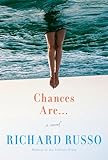 Here’s what Publishers Weekly had to say about Chances Are…: “Russo’s first standalone novel in a decade (after Everybody’s Fool) mixes his signature themes—father-and-son relationships, unrequited love, New England small-town living, and the hiccups of aging—with stealthy clue-dropping in a slow-to-build mystery about a young woman’s 1971 disappearance. Set mostly in Martha’s Vineyard circa 2015 with flashbacks to the characters’ coming-of-age in the 1960s and ’70s, the story follows three college buddies who, now in their mid-60s, decide to reunite on the island. There’s Lincoln, a happily married and successful real estate broker with six kids; Teddy, an editor and publisher of a small university press who’s prone to panic attacks and disorienting spells that leave him depressed; and Mickey, a musician renowned for his ability to rock hard, play hard, and sometimes beat up anyone in his way. Then there’s the missing link—gorgeous Jacy, the ‘three musketeers’ ’ closest gal pal from college and secret crush—who was engaged to ‘privileged, pre-school, Greenwich, Connecticut’ Vance, and had joined her boys at Lincoln’s Vineyard cabin for one last hurrah before she vanished. Relayed in alternating chapters from mostly Lincoln and Teddy’s perspectives, the narrative touches on the Vietnam draft, Lincoln’s complicated relationship with his dogmatic father and meek mother, and an accident that befalls Teddy. In the final stretch, surprising, long-kept secrets are revealed. This is vintage Russo.”
Here’s what Publishers Weekly had to say about Chances Are…: “Russo’s first standalone novel in a decade (after Everybody’s Fool) mixes his signature themes—father-and-son relationships, unrequited love, New England small-town living, and the hiccups of aging—with stealthy clue-dropping in a slow-to-build mystery about a young woman’s 1971 disappearance. Set mostly in Martha’s Vineyard circa 2015 with flashbacks to the characters’ coming-of-age in the 1960s and ’70s, the story follows three college buddies who, now in their mid-60s, decide to reunite on the island. There’s Lincoln, a happily married and successful real estate broker with six kids; Teddy, an editor and publisher of a small university press who’s prone to panic attacks and disorienting spells that leave him depressed; and Mickey, a musician renowned for his ability to rock hard, play hard, and sometimes beat up anyone in his way. Then there’s the missing link—gorgeous Jacy, the ‘three musketeers’ ’ closest gal pal from college and secret crush—who was engaged to ‘privileged, pre-school, Greenwich, Connecticut’ Vance, and had joined her boys at Lincoln’s Vineyard cabin for one last hurrah before she vanished. Relayed in alternating chapters from mostly Lincoln and Teddy’s perspectives, the narrative touches on the Vietnam draft, Lincoln’s complicated relationship with his dogmatic father and meek mother, and an accident that befalls Teddy. In the final stretch, surprising, long-kept secrets are revealed. This is vintage Russo.”
The Chelsea Girls by Fiona Davis
 Here’s what Publishers Weekly had to say about The Chelsea Girls: “The strong friendship between two women who meet performing in USO shows during WWII is tested as the country descends into McCarthy-era madness in the solid latest from Davis (The Masterpiece). Hazel Ripley is a perennial understudy, pushed into performance by a mother who is grieving Hazel’s brother, a talented actor who died during the war. When Hazel joins the USO tour as the maid in Blythe Spirit, she initially dislikes star Maxine Mead, but as the women endure a sideline view to the horrors of war, they find that they are a good team, with Maxine acting and Hazel writing. After the war, they meet again in New York City when both are living at the Chelsea Hotel. Maxine has become a rising Hollywood starlet, and Hazel is staging her first play on Broadway. Soon the Red Scare consumes the nation, and Hazel is flagged as a possible communist and threatened with being blacklisted due to her association with Chelsea Hotel proprietor Lavinia Smarts. Maxine and Hazel are fearful their newly found community might be broken apart when they find mysterious men investigating the building. As a government agent appears to monitor rehearsals, Hazel is irritated but remains confident there’s nothing to be found. However, as the production nears opening night, Hazel worries her confidence could be misplaced. Featuring vibrant, witty characters who not only weather but thrive in a dark period of American history, Davis’s tale of one friendship’s strength will stun and satisfy readers.”
Here’s what Publishers Weekly had to say about The Chelsea Girls: “The strong friendship between two women who meet performing in USO shows during WWII is tested as the country descends into McCarthy-era madness in the solid latest from Davis (The Masterpiece). Hazel Ripley is a perennial understudy, pushed into performance by a mother who is grieving Hazel’s brother, a talented actor who died during the war. When Hazel joins the USO tour as the maid in Blythe Spirit, she initially dislikes star Maxine Mead, but as the women endure a sideline view to the horrors of war, they find that they are a good team, with Maxine acting and Hazel writing. After the war, they meet again in New York City when both are living at the Chelsea Hotel. Maxine has become a rising Hollywood starlet, and Hazel is staging her first play on Broadway. Soon the Red Scare consumes the nation, and Hazel is flagged as a possible communist and threatened with being blacklisted due to her association with Chelsea Hotel proprietor Lavinia Smarts. Maxine and Hazel are fearful their newly found community might be broken apart when they find mysterious men investigating the building. As a government agent appears to monitor rehearsals, Hazel is irritated but remains confident there’s nothing to be found. However, as the production nears opening night, Hazel worries her confidence could be misplaced. Featuring vibrant, witty characters who not only weather but thrive in a dark period of American history, Davis’s tale of one friendship’s strength will stun and satisfy readers.”
Marilou Is Everywhere by Sarah Elaine Smith
 Here’s what Publishers Weekly had to say about Marilou Is Everywhere: “Smith’s solid debut follows the isolated and overlooked life of a teen in rural Pennsylvania. After 14-year-old Cindy Stoat and her older brothers, Clinton and Virgil, are abandoned by their mother, they make do with canned goods, candy, and income from the brothers’ lawn-mowing business amid the constant meddling of education officials who hope to bring Cindy back to school. Their stagnant and isolated existence is broken open when a teenage neighbor, Jude Vanderjohn, goes missing. A popular but complicated girl, Jude is so much of what Cindy herself feels she could never be, and her disappearance rocks not only the community, but Cindy’s day-to-day existence, especially after Virgil begins bringing her to spend time with Jude’s mother, Bernadette. Bernadette is a former hippie, a half-mystic, and an alcoholic who mistakes Cindy for her disappeared daughter, an identity crisis that Cindy cherishes, hoping desperately for her life to change, and leading to a terrible decision as she tries to maintain the illusion. Smith’s rural world is brought to life with precise and devastating descriptions of poverty and neglect, though sometimes the lyricism of the prose doesn’t gel. Still, fans of Gabriel Tallent’s My Absolute Darling will appreciate Cindy’s toughened point of view and Smith’s close attention to the details of rural Appalachian life. This is a promising debut.”
Here’s what Publishers Weekly had to say about Marilou Is Everywhere: “Smith’s solid debut follows the isolated and overlooked life of a teen in rural Pennsylvania. After 14-year-old Cindy Stoat and her older brothers, Clinton and Virgil, are abandoned by their mother, they make do with canned goods, candy, and income from the brothers’ lawn-mowing business amid the constant meddling of education officials who hope to bring Cindy back to school. Their stagnant and isolated existence is broken open when a teenage neighbor, Jude Vanderjohn, goes missing. A popular but complicated girl, Jude is so much of what Cindy herself feels she could never be, and her disappearance rocks not only the community, but Cindy’s day-to-day existence, especially after Virgil begins bringing her to spend time with Jude’s mother, Bernadette. Bernadette is a former hippie, a half-mystic, and an alcoholic who mistakes Cindy for her disappeared daughter, an identity crisis that Cindy cherishes, hoping desperately for her life to change, and leading to a terrible decision as she tries to maintain the illusion. Smith’s rural world is brought to life with precise and devastating descriptions of poverty and neglect, though sometimes the lyricism of the prose doesn’t gel. Still, fans of Gabriel Tallent’s My Absolute Darling will appreciate Cindy’s toughened point of view and Smith’s close attention to the details of rural Appalachian life. This is a promising debut.”
This Is Not America by Jordi Puntí
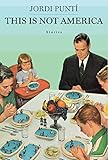 Here’s what Publishers Weekly had to say about This Is Not America: “This thoughtful collection of short stories from Catalonian writer and translator Puntí (Lost Luggage) is set primarily in Barcelona and largely features a cast of jaded male protagonists. Though the stories often blend together, one not particularly standing out from the other, memorable instances occur throughout, such as the somber twist at the end of ‘Kidney,’ about a loner ignoring letters from his sick, estranged brother. In ‘My Best Friend’s Mother,’ and ‘Consolation Prize,’ men pursue fantasies of women they barely know, then realize their dream doesn’t match their reality. In ‘Seven Days on the Love Boat,’ a disgruntled husband exchanges anniversary tickets to France for a solo trip on a Mediterranean cruise liner, where he meets a sage American pianist. In ‘The Miracle of the Loaves and the Fishes,’ a Catalonian with a gambling problem moves to Las Vegas, where he manages to turn his addiction into an unexpected career. Although the collection lacks variety, the stories make for a consistently pleasant reading experience, especially when consumed in small doses.”
Here’s what Publishers Weekly had to say about This Is Not America: “This thoughtful collection of short stories from Catalonian writer and translator Puntí (Lost Luggage) is set primarily in Barcelona and largely features a cast of jaded male protagonists. Though the stories often blend together, one not particularly standing out from the other, memorable instances occur throughout, such as the somber twist at the end of ‘Kidney,’ about a loner ignoring letters from his sick, estranged brother. In ‘My Best Friend’s Mother,’ and ‘Consolation Prize,’ men pursue fantasies of women they barely know, then realize their dream doesn’t match their reality. In ‘Seven Days on the Love Boat,’ a disgruntled husband exchanges anniversary tickets to France for a solo trip on a Mediterranean cruise liner, where he meets a sage American pianist. In ‘The Miracle of the Loaves and the Fishes,’ a Catalonian with a gambling problem moves to Las Vegas, where he manages to turn his addiction into an unexpected career. Although the collection lacks variety, the stories make for a consistently pleasant reading experience, especially when consumed in small doses.”
The Accidentals by Minrose Gwin
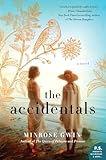 Here’s what Publishers Weekly had to say about The Accidentals: “Evocatively depicting the small town of Opelika, Miss., in 1957, Gwin (Promise) tells the heart-rending story of a mother feeling trapped in her life, whose death throws her family into turmoil. Olivia goes to a ‘chiropractor’ for an illegal abortion, dying a few days later from complications. Her husband, Holly, copes by trying to protect his daughters from the unlikely threats of bombs and natural disasters while ignoring their emotional needs. The older daughter, Grace, blames herself for not finding Olivia sooner, and her own poor choices lead to her becoming pregnant at 16 and getting sent away to have the baby in secret. The younger daughter, June, grows up to marry unhappily. Meanwhile, Ed Mae, the orphanage worker who cares for Grace’s child, has a moment of distraction that leads to complex consequences. Though the story is wrought with sadness, there’s a sense of hope that those thrown off course may find happiness in the end. Fans of tear-jerkers will forgive the occasional too-pat coincidence as Gwin brings all the threads together for an uplifting finale. This is a satisfying fable of errors and consequences in a tumultuous era.”
Here’s what Publishers Weekly had to say about The Accidentals: “Evocatively depicting the small town of Opelika, Miss., in 1957, Gwin (Promise) tells the heart-rending story of a mother feeling trapped in her life, whose death throws her family into turmoil. Olivia goes to a ‘chiropractor’ for an illegal abortion, dying a few days later from complications. Her husband, Holly, copes by trying to protect his daughters from the unlikely threats of bombs and natural disasters while ignoring their emotional needs. The older daughter, Grace, blames herself for not finding Olivia sooner, and her own poor choices lead to her becoming pregnant at 16 and getting sent away to have the baby in secret. The younger daughter, June, grows up to marry unhappily. Meanwhile, Ed Mae, the orphanage worker who cares for Grace’s child, has a moment of distraction that leads to complex consequences. Though the story is wrought with sadness, there’s a sense of hope that those thrown off course may find happiness in the end. Fans of tear-jerkers will forgive the occasional too-pat coincidence as Gwin brings all the threads together for an uplifting finale. This is a satisfying fable of errors and consequences in a tumultuous era.”
In the Country of Women by Susan Straight
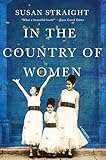 Here’s what Publishers Weekly had to say about In the Country of Women: “Novelist Straight (Between Heaven and Here) focuses on the lives of the women in her family in this moving memoir. The narrative is framed as a letter to Straight’s three daughters—Gaila, Delphine, and Rosette—whom Straight shares with her ex-husband Dwayne Sims, and honors the daughters’ rich ancestral past through stories of female relatives struggling to overcome violence, oppression, and hardship. Straight celebrates Jennie Stevenson, an aunt on the Sims side who, in the early 1900s, shot a man who cornered her, and Straight’s mother, a Swiss immigrant who left home after her stepmother tried to marry her off at 15 to a pig farmer. The author excels in chapters about raising her kids, and about finding her place in the Sims clan (Straight is white, Sims is African-American). She feels indebted to her mother-in-law, Alberta Sims, who showed her how to keep family and friends close (‘she took my hand and led me to the kitchen…. Alberta cooked for the whole community’). In the touching final chapter, Straight reflects on the enduring power of memory: ‘All we women have to give you is memory…. What we felt we might keep to ourselves, unless someone wrote it down.’ Straight passionately illuminates the hard journeys of women.”
Here’s what Publishers Weekly had to say about In the Country of Women: “Novelist Straight (Between Heaven and Here) focuses on the lives of the women in her family in this moving memoir. The narrative is framed as a letter to Straight’s three daughters—Gaila, Delphine, and Rosette—whom Straight shares with her ex-husband Dwayne Sims, and honors the daughters’ rich ancestral past through stories of female relatives struggling to overcome violence, oppression, and hardship. Straight celebrates Jennie Stevenson, an aunt on the Sims side who, in the early 1900s, shot a man who cornered her, and Straight’s mother, a Swiss immigrant who left home after her stepmother tried to marry her off at 15 to a pig farmer. The author excels in chapters about raising her kids, and about finding her place in the Sims clan (Straight is white, Sims is African-American). She feels indebted to her mother-in-law, Alberta Sims, who showed her how to keep family and friends close (‘she took my hand and led me to the kitchen…. Alberta cooked for the whole community’). In the touching final chapter, Straight reflects on the enduring power of memory: ‘All we women have to give you is memory…. What we felt we might keep to ourselves, unless someone wrote it down.’ Straight passionately illuminates the hard journeys of women.”
The Other’s Gold by Elizabeth Ames
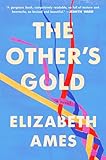 Here’s what Publishers Weekly had to say about The Other’s Gold: “Four women form an intense bond as college freshmen and support one another through life-altering mistakes across a decade and a half in Ames’s unfocused debut. In 2002, sporty Alice, uber-rich Ji Sun, stunningly beautiful but academically struggling Margaret, and feisty, adopted Lainey arrive at Quincy-Hawthorne College. After immediate friendship, Alice divulges that years before she caused her brother’s intellectual disability by intentionally pushing him off a tractor. In their sophomore year, all four become entranced by a popular professor until Ji Sun fabricates a claim of sexual harassment against him. After college they all gravitate to New York City, where Lainey becomes a well-known voice of the Occupy Movement and Alice struggles with fertility problems. The foursome’s friendship cools when Margaret, now a popular blogger and wife to a wealthy scion, crosses a serious line, and drifts further apart when Lainey makes an even more shocking mistake. Ames rarely provides sufficient retribution for characters’ bad decisions, and the tangents about their lives become distracting. Though there are moments of powerful emotion, and the details and emotional crises are well drawn, most readers will feel frustrated by the meandering plot and the characters’ choices.”
Here’s what Publishers Weekly had to say about The Other’s Gold: “Four women form an intense bond as college freshmen and support one another through life-altering mistakes across a decade and a half in Ames’s unfocused debut. In 2002, sporty Alice, uber-rich Ji Sun, stunningly beautiful but academically struggling Margaret, and feisty, adopted Lainey arrive at Quincy-Hawthorne College. After immediate friendship, Alice divulges that years before she caused her brother’s intellectual disability by intentionally pushing him off a tractor. In their sophomore year, all four become entranced by a popular professor until Ji Sun fabricates a claim of sexual harassment against him. After college they all gravitate to New York City, where Lainey becomes a well-known voice of the Occupy Movement and Alice struggles with fertility problems. The foursome’s friendship cools when Margaret, now a popular blogger and wife to a wealthy scion, crosses a serious line, and drifts further apart when Lainey makes an even more shocking mistake. Ames rarely provides sufficient retribution for characters’ bad decisions, and the tangents about their lives become distracting. Though there are moments of powerful emotion, and the details and emotional crises are well drawn, most readers will feel frustrated by the meandering plot and the characters’ choices.”
Black Card by Chris L. Terry
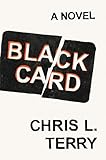 Here’s what Publishers Weekly had to say about Black Card: “Terry’s darkly humorous coming-of-age novel (after Zero Fade) explores the nuances and challenges of being a young black man in America. A punk rock bassist with a white mother and black father living in Richmond, Va., the unnamed narrator struggles with feeling ‘black enough.’ ‘Being mistaken for white erases half of me,’ he muses, ‘and happens so often that I think I’ve failed at blackness.’ In a desperate attempt to finally earn his Black Card—an actual card—he indulges in misconceived stereotypes of blackness. He tries to ‘speak more black’ and changes up his style of dress. He earns his card but has it revoked by his guide/mentor Lucius when he fails to speak up during a racist incident. Determined to earn back his card, he performs rap songs at a white karaoke bar and musters up the courage to ask out his black coworker, Mona. When Mona is assaulted in her apartment, he becomes a suspect and is finally forced to face his racial identity. ‘The minute Mona told the cops about me, she’d given me something. She’d made it so I’d never, ever doubt that I was black.’ This memorable, deeply insightful work has echoes of Ralph Ellison’s Invisible Man. Terry’s provocative and timely novel challenges readers to confront the racial stereotypes and injustices in America.”
Here’s what Publishers Weekly had to say about Black Card: “Terry’s darkly humorous coming-of-age novel (after Zero Fade) explores the nuances and challenges of being a young black man in America. A punk rock bassist with a white mother and black father living in Richmond, Va., the unnamed narrator struggles with feeling ‘black enough.’ ‘Being mistaken for white erases half of me,’ he muses, ‘and happens so often that I think I’ve failed at blackness.’ In a desperate attempt to finally earn his Black Card—an actual card—he indulges in misconceived stereotypes of blackness. He tries to ‘speak more black’ and changes up his style of dress. He earns his card but has it revoked by his guide/mentor Lucius when he fails to speak up during a racist incident. Determined to earn back his card, he performs rap songs at a white karaoke bar and musters up the courage to ask out his black coworker, Mona. When Mona is assaulted in her apartment, he becomes a suspect and is finally forced to face his racial identity. ‘The minute Mona told the cops about me, she’d given me something. She’d made it so I’d never, ever doubt that I was black.’ This memorable, deeply insightful work has echoes of Ralph Ellison’s Invisible Man. Terry’s provocative and timely novel challenges readers to confront the racial stereotypes and injustices in America.”
God Land by Lyz Lenz
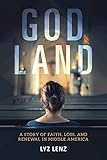 Here’s what Publishers Weekly had to say about God Land: “Journalist Lenz blends memoir and reporting in this slim but powerful debut on the faith and politics of Middle America. After a lifetime of straining against her prescribed place within a white, Protestant world, Lenz left both her marriage and church in the wake of the 2016 election. Unable to compromise any longer with a husband who voted for Donald Trump, and unable to worship at a church that ignored violent white supremacy, divorce and departure become her only path forward. ‘The story of who leaves the church,’ Lenz writes, ‘is just as important as the story of who stays.’ In a series of episodic chapters, the author travels across the Midwest exploring stories of both the belonging and exclusion she finds there. Highlights include her tale of a home church that imploded around questions of authority and submission, and her tracking of a resurgent ‘muscular’ and patriarchal Christianity. She also reveals online and physical communities built by women, queer Christians, and people of color pushed out of conservative evangelical spaces. This work will resonate with any readers interested in understanding American landscapes where white, evangelical Christianity dominates both politics and culture.”
Here’s what Publishers Weekly had to say about God Land: “Journalist Lenz blends memoir and reporting in this slim but powerful debut on the faith and politics of Middle America. After a lifetime of straining against her prescribed place within a white, Protestant world, Lenz left both her marriage and church in the wake of the 2016 election. Unable to compromise any longer with a husband who voted for Donald Trump, and unable to worship at a church that ignored violent white supremacy, divorce and departure become her only path forward. ‘The story of who leaves the church,’ Lenz writes, ‘is just as important as the story of who stays.’ In a series of episodic chapters, the author travels across the Midwest exploring stories of both the belonging and exclusion she finds there. Highlights include her tale of a home church that imploded around questions of authority and submission, and her tracking of a resurgent ‘muscular’ and patriarchal Christianity. She also reveals online and physical communities built by women, queer Christians, and people of color pushed out of conservative evangelical spaces. This work will resonate with any readers interested in understanding American landscapes where white, evangelical Christianity dominates both politics and culture.”
Doxology by Nell Zink
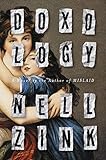 Here’s what Publishers Weekly had to say about Doxology: “Beginning in the early days of the 1990s and moving through the years to the 2016 election, Zink’s solid fourth novel (after Nicotine) follows the exploits of the members of a short-lived New York City punk band. Pam and Daniel have a daughter, Flora, before their careers can even begin to take off; meanwhile, Joe, the singer, has a breakthrough when he writes an unexpected hit single. As his fame grows, Pam and Daniel focus on raising Flora. On 9/11, everything changes, not just because of the attacks, but also because of an unexpected death that occurs on the same day. The second half of the book focuses more on Flora’s coming-of-age as she, among other things, becomes a campaign staffer for Jill Stein. As time passes, Zink infuses the novel with as many period details as possible (for instance, ‘bricklike cell phones’), but the repeated intrusion of the narrator explaining the political and cultural developments during the last 30 years becomes a bit overbearing and, worse, mostly unnecessary. Still, Zink’s gifts for characterization and richly evoked periods and places are on display throughout. Zink’s longest novel is her most ambitious and perhaps her most effective.”
Here’s what Publishers Weekly had to say about Doxology: “Beginning in the early days of the 1990s and moving through the years to the 2016 election, Zink’s solid fourth novel (after Nicotine) follows the exploits of the members of a short-lived New York City punk band. Pam and Daniel have a daughter, Flora, before their careers can even begin to take off; meanwhile, Joe, the singer, has a breakthrough when he writes an unexpected hit single. As his fame grows, Pam and Daniel focus on raising Flora. On 9/11, everything changes, not just because of the attacks, but also because of an unexpected death that occurs on the same day. The second half of the book focuses more on Flora’s coming-of-age as she, among other things, becomes a campaign staffer for Jill Stein. As time passes, Zink infuses the novel with as many period details as possible (for instance, ‘bricklike cell phones’), but the repeated intrusion of the narrator explaining the political and cultural developments during the last 30 years becomes a bit overbearing and, worse, mostly unnecessary. Still, Zink’s gifts for characterization and richly evoked periods and places are on display throughout. Zink’s longest novel is her most ambitious and perhaps her most effective.”









